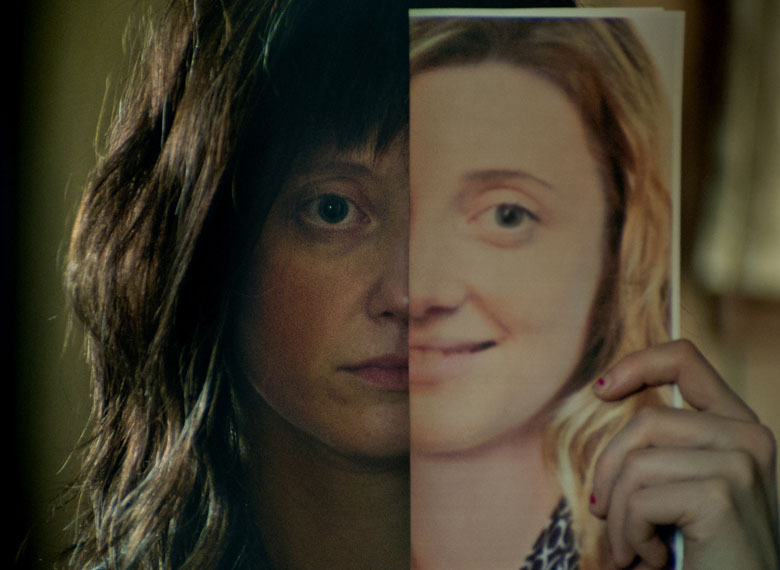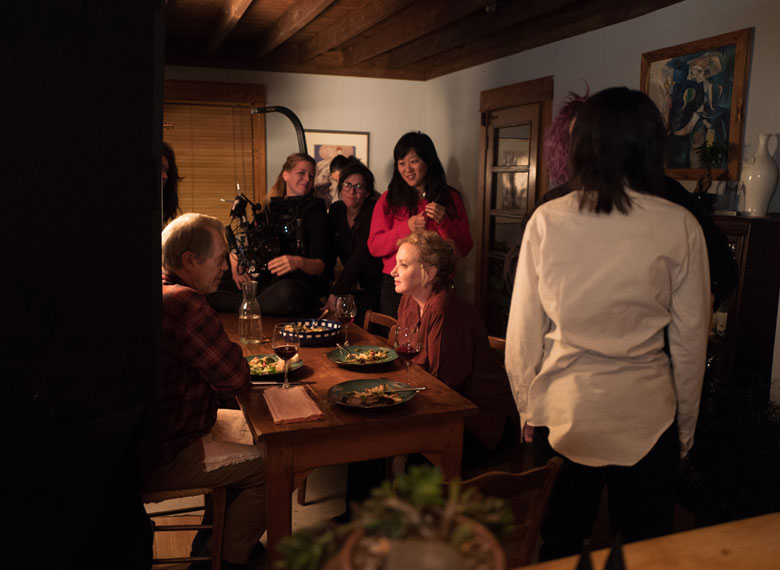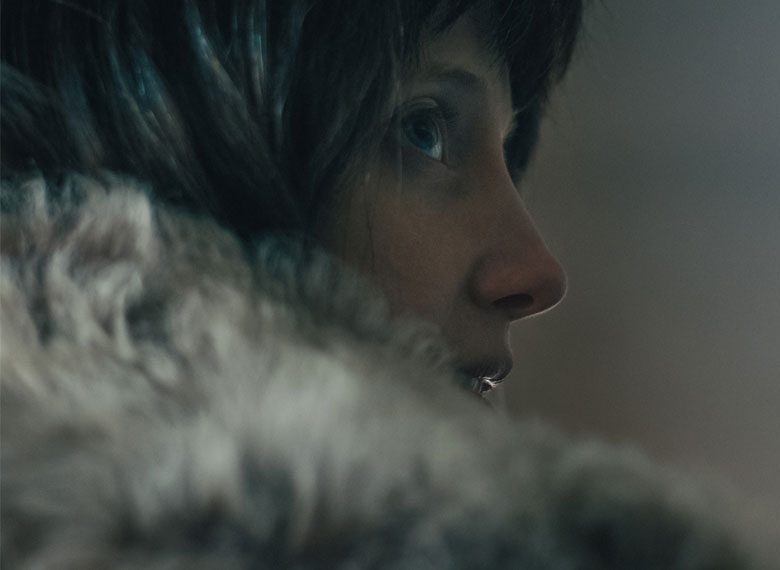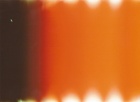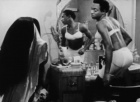I saw Christina Choe's movie before I met her. I was in my first year at Columbia when a professor showed her short, The Queen (2010), as an example of good work. Christina was in the year ahead of me, but timing and circumstance brought us together as roommates for two years in Brooklyn. During that time, she was working on getting Nancy made. Whenever the process was particularly heart, back, or bank-breaking, we would joke that I should make a documentary about a filmmaker trying to get her movie made. Since then, she's made the movie and gone to Sundance, where she won the festival's Waldo Salt Screenwriting Award for best screenplay. She also moved to Los Angeles, where she signed with the William Morris agency. Maybe we should have made that doc; it would have had a happy ending. Instead, we did this interview.
Interview with Christina Choe, recorded March 7th, 2018 in Los Angeles, CA. This interview has been edited for length.
Berkley Brady (BB): How would you summarize the journey of [Nancy] actually getting greenlit? How many years?
Christina Choe (CC): From conception of idea, to getting in the can and premiering? I think about five years. And I would describe the journey as a rollercoaster. It came together a few times then fell apart. It’s almost like you’re climbing Mount Everest several times. First time, you fall down. Second time, you’re almost at the top, but you fall. Then you get up and try again. And something else happens. You almost get the money, they drop out, and you fall back down. And then you have to be like, ‘Okay, I guess I’m going to keep going and try again.’ It’s not an overnight success. It’s a lot of perseverance and effort, especially if you don’t have a network of high-net-worth individuals at your disposal. Or in your family.
BB: How many indie films are actually produced because people are wealthy?
CC: A lot. I mean, think about how many people we went to film school with who were wealthy. Not just wealthy, but extremely wealthy. Like, that person that has an elevator in their house . . . and they would pretend they were struggling artists. And then there were a bunch of us that did have to work a lot. Not just go through the film school experience, which is grueling, but I had fellowships. As did you.
BB: We practically lived there. Do you think it’s worth it going to film school?
CC: I don’t think everyone needs it, especially now. It was expensive when we went, but it’s just getting more and more ridiculous, becoming more and more for the elite, and I think there’s a real problem with the structure of film school. I mean . . . it’s just too fucking expensive. And I had a lot of scholarships and grants and help, but it still wasn’t a full ride and I had to take on debt. But . . . some people take the entire thing on in debt, and it’s insane. To be hundreds of thousands of dollars in debt. I mean, you could make a movie with that! It might not be good, but maybe you could figure it out.
It’s not an overnight success. It’s a lot of perseverance and effort, especially if you don’t have a network of high-net-worth individuals at your disposal. Or in your family.
At the time [though], it was necessary for me. I had made some short documentaries, I was editing, I had written my first narrative feature script—“Guess Who’s Coming for Kimchi?”—which was very much based on my life at the time. Really, the next step was to make the movie, but . . . I didn’t know how to direct actors. It seemed more fantastical and foreign. I also didn’t know any filmmakers when I was starting. I looked up to people and watched tons of films but personally, I did not know a single filmmaker that I could just say ‘Hey, how did you do that?’ So for me the only thing I knew was that I could go to film school.
I had been out of undergrad for a while. I’d had jobs and lived life and all of that stuff, so by the time I went, I think I was really ready, and really hungry to learn . . . I think I made four or five short films. I think I directed four and wrote the fifth one. I wrote two feature scripts and a TV spec. Yeah. Minimum. It was just a lot of productivity. I really liked having mentorship. We had some amazing professors, and I was really soaking it in. I really loved it.
BB: Speaking of professors, can you tell me about the inspiration for writing Nancy?
CC: One of our professors in film school—Nick Proferes—was the DP on this amazing film from the ’70s called Wanda (1970), which was written, directed by Barbara Loden, who also starred. At the time, she was a pretty well-known actress and also married to Elia Kazan.
I remember Nick showed the film at some screening. It’s sort of like a gritty version of Bonnie and Clyde (1967), with that gritty realism look, and it’s just so well done. After seeing it, I remember having this problem empathizing with her, thinking, ‘Why is she so lost? Why does she made such bad decisions?’ [Laughing] I remember having that reaction, and when I saw it again later, I was like, ‘Wow, this is a masterpiece and I think I have just never seen a film where the female character is lost, morally ambiguous and making bad choices.’ Any kind of TV show now, every single character is a morally duplicitous male protagonist, like Tony Soprano, Walter White from Breaking Bad, all the way back to Taxi Driver (1976). There’s so many, many, many male examples of it, but I realized kind of later on that I’d never really seen that in female protagonists.
BB: I remember when we were roommates—I guess that was four years ago—you were one of the first people I remember talking about the female anti-hero.
CC: Yeah. Even now, there’s not so many out there. I used to make this joke about how, if Nancy was starring Matt Damon, it would have been made in five seconds. But anyways . . . then I started reading a lot of imposter stories . . . You have things like the JT LeRoy literary hoax, which is a real fascination for me. She wrote these books about a young boy who was hustling, a young male prostitute, and then she would do these interviews with all these journalists and famous people from that perspective, and “he” turned out to be this 45-year-old woman from San Francisco. And then on top of that—and I just realized this recently—actually those books weren’t ever in the Memoir section. They were labeled as ‘Fiction.’ In a way, it’s more about what we’re expecting from our authors. And when she came out and talked about it, she said the character was a metaphor for the traumatic things that happened in her childhood. Whether or not that’s true, I don’t know, but all of that was really interesting to me.
Any kind of TV show now, every single character is a morally duplicitous male protagonist, like Tony Soprano, Walter White from Breaking Bad, all the way back to Taxi Driver (1976) . . . but I realized kind of later on that I’d never really seen that in female protagonists.
And then, you know, I later found out that one of my college professors was an imposter. He was this really charismatic teacher, the whole Dead Poets Society (1989) thing, where we would just worship everything he said, and he was very profound. And he looked like Jesus. He told us that he had written these huge Hollywood franchises. It turned out he had lied to his family and the students. After it came out, a lot of people felt betrayed. I was shocked, but then I was super-fascinated. If I had the experience, does it matter that he lied? Does it change the fact he was one of the most inspiring teachers I ever had? He really inspired me to write about truth, ironically. My favorite quote of his was, “Write what breaks your heart because what breaks your heart will mend your heart.” I still think that’s something that I always aim for, or aspire to, in my work. And that’s really valuable. You can have a million credits on your resume, but it doesn’t mean that you’re a good teacher. It doesn’t mean you can inspire someone. And I know a lot of people who feel that way. And a lot of them probably became successful filmmakers and writers. And that theme, of does it really matter if someone’s lying if the love—or experience—felt genuine, authentic or true? That’s what’s at the heart of Nancy, thematically.
BB: Aside from Wanda, what were some other films you were looking at, and what was anchoring your thoughts while designing shots?
CC: I was looking at Taxi Driver, Safe (1995) by Todd Haynes, which is another film about a woman who’s going through an environmental illness, but people aren’t really sure. Is she going crazy or does she have this environmental illness? I looked at a lot of Gregory Crewdson photos. And just sorta the darkness of that lower-rung suburbia. That alienation of a small figure in the landscape. What else? I love Close-Up (1990) by Abbas Kiarostami. He pretends to be this Iranian filmmaker, which is actually based on something that happened and then they got the guy that actually did it to play the role. Some of it is fictionalized and some of it is actors. Maybe because I came from documentary, I’ve always loved—they call it hybrid now, which I think is sort of a cheap term—but this fine line between documentary and narrative, truth and fiction and what is constructed. That aspect of it was always fascinating to me.
BB: Did you write the script in terms of shots?
CC: I don’t write in terms of shots. I just can’t think about that until it’s done. But we had a general visual strategy—which we didn’t always stick to, because I don’t think you should be too black and white about things—but we had this idea about Nancy’s world when she’s living with her mother, Betty. It’s this claustrophobic, oppressive town where she feels trapped. And then she goes off and thinks she could be the daughter of this couple. And how that world should feel and look different. Her world is expanding, the class aspirations, her world becoming more vibrant, alive. She’s feeling more hopeful. So there was always that element of two different worlds.
. . . does it really matter if someone’s lying if the love—or experience—felt genuine, authentic or true? That’s what’s at the heart of Nancy, thematically.
And the aspect ratio was a part of that discussion. Not just lighting or colours. I think at first I thought the whole thing would be 4:3 aspect ratio because I really love that aspect ratio. I think it’s so suited for a character, a single character, because it’s more flattering in a way. But it also traps you into this box. But then once we started scouting, I just had this feeling that once Nancy went to Ellen and Leo’s house—played by J. Smith-Cameron and Steve Buscemi—that the box was too confining. I felt we needed to go out [and enlarge the aspect ratio]. And I remember everyone was nervous about the switch. I had ideas about it, so we shot it. Betty’s world is 4:3, and when she goes to Ellen and Leo’s, it’s 16:9. We ended up figuring out the change between them in the editing. My editor David Gutnick, who’s really great, amazing, he knew that was the goal. And we tried different things, but ultimately what we settled on was, when she’s leaving that house, and that shot, the transition is hidden. A lot of people didn’t even notice.
BB: I’d love to hear more about your collaboration with Andrea.
CC: The brilliant Andrea Riseborough.
BB: I’m a huge fan.
CC: She’s incredible. When I was sent her work, I was just like, holy shit. It was immediate. I mean, you know me. I very rarely get that lightning feeling, like, ‘That person’s a fucking genius.’ I’ve said it maybe five times in my life. It was that. I’d seen her play Margaret Thatcher, an IRA spy. She never plays the same character again. She’s a shapeshifter. For Nancy it wasn’t just changing her appearance, the voice changes. Her posture. When I see her in real life, I forget she was Nancy because it’s so far from who she is in real life. You see her fucking craft. It’s not just, ‘I’m going to change my look and my hair.’ It’s complete metamorphosis. And on top of that, she’s a fucking amazing actor. And maybe I’m biased now, but she has that thing I think you can’t teach, which is that you can read everything that’s going on in her mind and emotions just by watching her face. And that was always something I told my casting director: ‘I just want to find someone I could watch read a telephone book.’
BB: You can see her reactions fluttering through her body. And she was a big part of getting this film actually made. Do you want to talk about that?
CC: A big part of how this got made was when she became involved as a producer. She basically was helping get the script to people. She sent it to Barbara Broccoli.
BB: In a strange coincidence, my mom went to high-school with [Barbara Broccoli] in England! Could you talk about who she is, for people who don’t know?
CC: She’s really a huge producer. She’s basically produced all the James Bond films, and she’s a real trailblazer and supporter of the arts. She wanted to [produce Nancy] for all the purest reasons. She loved Andrea—they had worked together on another film—and she really loved the script and wanted to support female filmmakers. And that’s when it really started happening.
BB: I just want to be on the record saying: I really hope you direct the next James Bond. That’s what I want to see happen, and you know I’ve been saying that for a really long time.
[Laughter]
CC: But you know, Andrea had done a couple things with John Leguizamo, and she had just done The Death of Stalin (2017) with Steve Buscemi and she was instrumental in getting them involved. And in the end, it was a dream collaboration. I know I’m super lucky, because we each wanted the same thing, as much as the other person. And that’s very, very rare. When you’re making an independent first feature, which is so difficult, you need to have these partners. It’s not about money. They’re all in it for very pure reasons. They want to make this film. As far as actors, I had the dream.
BB: You did. But you’re not someone who would have gone forward with people you weren’t sure about. . . . I think you’re someone with great taste, although taste itself is subjective.
CC: I think taste is totally subjective. Example: We just saw Annihilation (2018) and both loved it.
BB: Loved it.
CC: It’s been a long time since I really loved a film. And it was funny, because I was reading all the different reviews, and they were generally good, but there were a few from some really top critics…it was like they just didn’t have our taste. That’s a more positive way of saying it. You like what you like. Part of taste is also, when I don’t like something, it’s because I don’t believe it and it feels false. Whether it’s style, or story, I just think it’s bullshit. Yeah, that’s taste.
BB: Can you leave us with one movie you think everyone should know about?
CC: The Day I Became a Woman (2000). Have you seen this film?
BB: No!
CC: It’s an Iranian film, a triptych, three stories about three different women in Iran. About a transformative moment in their lives. It’s a perfect film. Amazing.
BB: Alright we’re done. Can you call cut?
CC: And…cut.
Christina Choe's debut feature Nancy recently premiered at Sundance in the US Dramatic Competition, where it won the Waldo Salt Best Screenplay Award and was acquired by Samuel Goldwyn Films for theatrical release in 2018. Nancy stars Andrea Riseborough, Steve Buscemi, Ann Dowd, John Leguizamo, and J. Smith-Cameron. Choe's docu-series Welcome To The DPRK, a personal portrait of North Korea, was also recently acquired and released by First Look Media. Her short films, I Am John Wayne won the Grand Jury Prize at the Slamdance Film Festival, with The Queen and Flow screening at Telluride, SXSW, Aspen, among many others. Additional honours include a year-long Directing Fellowship with HBO and a Roger and Chaz Ebert Foundation Fellowship awarded at the Independent Spirit Awards.

